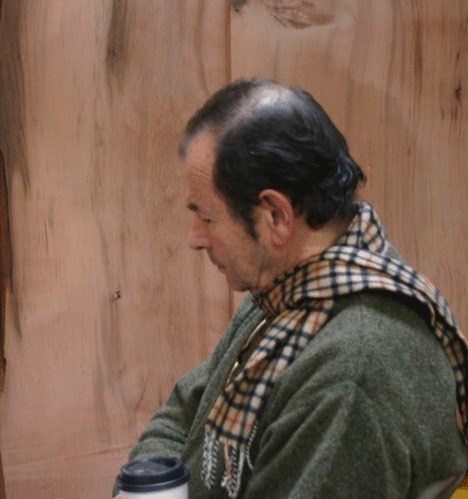It’s official: Drew Kampion and Kim Hoelting are fans of Walt Whitman.
And as ever-admiring as fans could possibly be, the two well-read Whidbeyites recently honored the great 19th century poet with a sunset-to-sunset reading of Whitman’s greatest collection of poems, “Leaves of Grass” in its entirety.
Kampion has been sending out Whitman’s poems via e-mail regularly to a local list of folks. Last week in a burst of inspiration, he sent out an invitation from himself and Hoelting to join them at Woodland Hall in Clinton to start reading at sunset on Monday, Dec. 28 and continue through sunset on Tuesday, Dec. 29.
The marathon was in full swing at 10 a.m. Tuesday at the historic hall where a fire and great gorgeous slabs of wood filled the rooms with an aromatic coziness, while four or five readers kept Whitman’s words aloft and on schedule.
In an introduction to “Leaves of Grass” Whitman wrote:
Come, said my soul,
Such verses for my Body let us write (for we are one)
That should I after return
Or long, long hence, in other spheres,
There to some group of mates the chants resuming,
(Tallying Earth’s soil, trees, winds, tumultuous waves,)
Ever with pleas’d smile
I may keep on,
Ever and ever yet the verses owning — as, first, I here and now
Signing for Soul and Body, set to them my name.
These words that open “Leaves of Grass,” first published in 1855, seem to call to those in the future — perhaps he was thinking
154 years hence to 2009 — to do exactly what Kampion and Hoelting have done.
And, so, after e-mails were sent out and a tentative schedule of which poems were to be read at which time, with breaks in between, measured out according to some unrestrictive math equations and educated guesses by Kampion and Hoelting on how long it would take to get through the tome entirely (about 21 hours give or take), they set upon the commendable task of honoring one of America’s greatest artists with his own words.
It’s as if they were following instructions of the poet to gather “some group of mates the chants resuming.”
Equipped with sleeping bags for catnaps, some cozy chairs and benches, snacks and an undisclosed amount of caffeine, Kampion and Hoelting were looking fairly dapper for having continued the reading through the night with a healthy smattering of visiting readers dropping by through the hours.
The invitation welcomed those who would come to just listen or to read a poem or two and create, as it were, some local literary history.
It was the “Deathbed Edition” that was used, published in 1891 (the copy happen to belong to Hoelting’s father-in-law who, in a noteable twist of fate, died during the night of the reading, while his daughter Heidi Hoelting read teary-eyed from his book.) Special-edition copies of “Leaves of Grass” were also available to anyone who needed one.
The words being recited were pure Whitman — effusive, full of lists, joyful, adamant, wishful, lusty, among other things. One’s youth comes flooding back. Kampion even noted how he was prompted, lately, to go back and read other texts he read in his younger days, simply because they mean something completely different to him now, as do the poems of “Leaves of Grass.”
Whitman had a handle on such meaningful ebbs and flows of his readers.
In one poem from the collection, entitled “Whoever you are, Holding me now in hand,” Whitman challenges the reader to keep what he writes forever:
Or if you will, thrusting me beneath your clothing,
Where I may feel the throbs of your heart or rest upon your hip,
Carry me when you go forth over land or sea;
For thus merely touching you is enough, is best,
And thus touching you would I silently sleep and be carried eternally.
So, Kampion and Hoelting have done a great service for the poet from Long Island, New York, he who fell in love with Manhattan and with all that it is deeply American by (to paraphrase the poet) “pouring forth the meanings which he of all men knew.”
As Hoelting said in the morning after reading through the night, “To watch myself be present through this whole thing is incredibly tedious and wonderful.”


